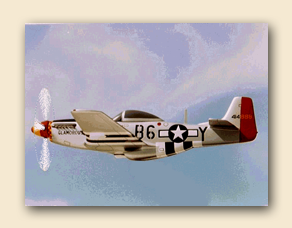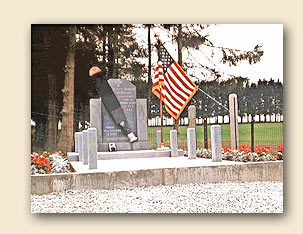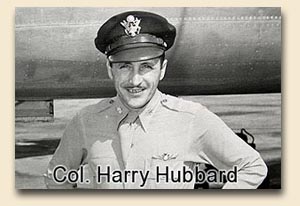Family Members ~ Articles of Interest |
From Belgium: Captain Lloyd HUBBARD, 1921-1944, Died in WW II (Fifteen years ago, the town of "Stave" in Belgium invited Harry and Dorothy
To commemorate the 50th Anniversary of the Liberation of Europe.
Like in many other towns and villages across Belgium, we are gathered here today to celebrate the 50th Anniversary of our Liberation. Coincidently, exactly 50 years ago, the first American allies arrived in Stave, to the great relief and great joy of the local population. At the time of the Liberation, even though the scenes of joy were very intense, there were also deep remorse and sorrow for the parents and friends of fallen soldiers. Along with our compatriots a large number of allied soldiers lost their lives in the efforts to chase the aggressor and thus re-establish freedom.
Among those soldiers, there was the brave American pilot, Captain Lloyd Moore HUBBARD who was shot down on the 8th of February 1944, at this very location. 50 years later, we would like to particularly honor him, along with his brothers in arms. In sum, here are several words which describe the circumstances in which the courageous U.S. Army Air Corps pilot perished.
In the beginning of 1944, the Allies intensified the raids and bombardments against Germany, thus systematically destroying the Nazi industrial complexes. These operations were part of a grander strategic plan, that of the allied invasion of occupied continental Europe. Between Great Britain and Germany, flying over Belgian territory was inevitable for the British bombers that operated during the night, and for the American bombers that operated during the day.
On February 8, 1944, a raid in the region of Frankfort organized by the 8th Air Force was conducted. Both the B-17
Lloyd HUBBARD came from a family of five children, four of which brothers. All four were passionate aviators and possessed private pilot licenses. After attending Hayward Union High School, they joined U.S. Army Air Corps. Once separated by their war duties, the four HUBBARD brothers served their respective divisions. Harry was assigned to serve in the Pacific in a unit of B-29 bombers; Meanwhile Lloyd and Glenn were assigned to the 357th Fighter Group based in England. The youngest, Melvin, was stationed in the Azores Islands in a Unit of B-24 bombers.
Suddenly, drama, one of the fighters is shot down by a deadly weapon. The plane bursts into flames and smoke before it crashes upon this very spot, in the field situated between the homes of the family Delmulle and that of the family Chenut. Eyewitness rushed to the scene in hope of aiding the shot down pilot. However, the impact of the crash was extremely violent, and the wreckage continued to burst into flames. The unfortunate pilot was dead.
The German soldiers also arrived very quickly at the crash site. They investigated the premises and evacuated the villagers from the area. Nonetheless some of the villagers managed to acquire pieces of the wreckage without the Germans knowledge. Part of the propeller was quickly found and hidden. Even some personal belongings of the unfortunate pilot were found and hidden away from the German investigators. Among these belongings, the helmet was retrieved, which revealed the identity of the pilot, “Captain HUBBARD; U.S. Army Air Corps”.
At the 357th Fighter Group, the news of Captain Hubbard's death created enormous sorrow. The young pilots, and among them brother Glenn Hubbard, just lost of their future “Flight Leader”. Three days later, the 357th Fighter Group became operational. It will distinguish itself through its great efficiency. By the end of the war, this Group will have accumulated 600 victories in an air combat. Among these pilots some have gone on to establish great reputations. Some being the friends of Lloyd Hubbard, such as Clarence E. Anderson, and Charles E. Yeager, who broke the record for the speed of sound, on his BELL X-1 on the 14th October 1947. After the war, they kept the memory of Lloyd Hubbard in their memoirs. At Leiston, where the 357th Fighter Group was stationed, a commemorating monument was erected to honor the members of this distinguished Group that perished during the war. The name of Captain Hubbard appears on this monument.
In Stave, Belgium; the population also has been very affected by the events of 1944. This is why, by the end of the war, the people of the village under the initiative of the family Delmulle have expressed their gratitude by constructing a monument in the memory of the pilot. The monument built at the very site of the crash is decorated with a piece of the propeller retrieved at that time. It was inaugurated in August 1945. Personal belongings were handed over to American Military Authorities. The family Chenut had sent a letter to the parents of the airman. This letter was of great comfort to the Hubbard family which was greatly affected by the loss of their son. Fortunately, the other three sons survived the war.
In 1946, the body of the deceased was transferred to the American Military Cemetery of Margraten, near Maastricht. Captain Hubbard decorated with the “Silver Star” and the “Purple Heart” is resting with his numerous compatriots fallen during the war.
The information above resulted from a long search. This search was successful thanks to the contribution of
This commemoration of the 50th Anniversary of the Liberation has offered a special opportunity to recall the memory of Captain pilot Lloyd Hubbard. His bravery is embedded in the village history affecting the memories of our eldest and in setting up for the youth an example for their contemplation.
I thank you very much for your attention.
Jacques THIRY
|
| TO TOP |
 Hubbard to be the honored guests at the 50th Anniversary of VE Day, the "Victory in Europe" in which nearly the whole town participated. The Mayor officiated, and there were speeches, food and entertainment. Harry's brother Lloyd had been shot down by the Nazi's and died there at age 23 on Feb. 8 1944. He had became a town hero for his sacrifice and its help towards the Liberation of Europe. They even had erected a monument for him with part of the
Hubbard to be the honored guests at the 50th Anniversary of VE Day, the "Victory in Europe" in which nearly the whole town participated. The Mayor officiated, and there were speeches, food and entertainment. Harry's brother Lloyd had been shot down by the Nazi's and died there at age 23 on Feb. 8 1944. He had became a town hero for his sacrifice and its help towards the Liberation of Europe. They even had erected a monument for him with part of the  and the B-24 were escorted by several fighter fire-planes, the P-51 “MUSTANG”. At the command of one of these Mustangs was a young Californian, 23 years of age, Captain Lloyd HUBBARD, who was part of the 357th Fighter Group, based at Leiston on the East coast of England.
and the B-24 were escorted by several fighter fire-planes, the P-51 “MUSTANG”. At the command of one of these Mustangs was a young Californian, 23 years of age, Captain Lloyd HUBBARD, who was part of the 357th Fighter Group, based at Leiston on the East coast of England. Within the 357th Fighter Group, Lloyd Hubbard, known as “Hub”, was considered an excellent pilot. His flying techniques were exceptional and thus gave confidence to his compatriots for their subsequent missions. By February 11, 1944, the P-51B “Mustang” were operational. But Captain Hubbard was already trained and ready with his new plane. So, on this 8th February, he was flying with the 354th Fighter Group.(353rd Fighter Squadron.). After accomplishing their mission over Frankfort, the Mustangs headed back towards England. Yet upon their return they flew over Florennes Air Base which was occupied by the Luftwaffe (German Air Force). Therefore again the fighters prepared themselves for another battle against the enemy. The four Mustangs plunged dangerously close to the ground and thus opened fire on the military installations.
Within the 357th Fighter Group, Lloyd Hubbard, known as “Hub”, was considered an excellent pilot. His flying techniques were exceptional and thus gave confidence to his compatriots for their subsequent missions. By February 11, 1944, the P-51B “Mustang” were operational. But Captain Hubbard was already trained and ready with his new plane. So, on this 8th February, he was flying with the 354th Fighter Group.(353rd Fighter Squadron.). After accomplishing their mission over Frankfort, the Mustangs headed back towards England. Yet upon their return they flew over Florennes Air Base which was occupied by the Luftwaffe (German Air Force). Therefore again the fighters prepared themselves for another battle against the enemy. The four Mustangs plunged dangerously close to the ground and thus opened fire on the military installations. It was the beginning of the afternoon, and the visibility was good. In the village the people were alarmed and surprised to see the great American machines. Although the danger was omnipresent, some villagers went outdoors to personally witness the mass destruction inflicted upon the Nazi aggressors.
It was the beginning of the afternoon, and the visibility was good. In the village the people were alarmed and surprised to see the great American machines. Although the danger was omnipresent, some villagers went outdoors to personally witness the mass destruction inflicted upon the Nazi aggressors.
 eyewitnesses through their recollection of these past events. As well as thanks to friends and acquaintances motivated by this kind of research. They have been of great help for both their experiences and documentation. I have been able to rely on the precious help from people in U. K. and Holland. In the U.S.A., people of Kansas City as well as members of the veterans association of the 357 F.G. have spared no effort to assemble my documentation. Support from the Hubbard family, and particularly from Colonel Harry Hubbard have contributed for a better understanding of the personality of his brother Lloyd.
eyewitnesses through their recollection of these past events. As well as thanks to friends and acquaintances motivated by this kind of research. They have been of great help for both their experiences and documentation. I have been able to rely on the precious help from people in U. K. and Holland. In the U.S.A., people of Kansas City as well as members of the veterans association of the 357 F.G. have spared no effort to assemble my documentation. Support from the Hubbard family, and particularly from Colonel Harry Hubbard have contributed for a better understanding of the personality of his brother Lloyd.